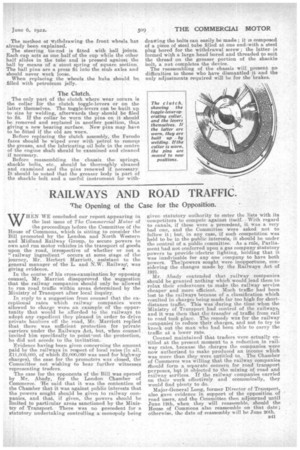RAILWAYS AND ROAD TRAFFIC.
Page 25

If you've noticed an error in this article please click here to report it so we can fix it.
The Opening of the Case for the Opposition.
WHEN WE concluded our report appearing in the last issue of The Commercial Motor of the proceedings before the Committee of the House of Commons, which is sitting to consider the Bill promoted by the London and North Western and Midland Railway Group, to secure powers to own and run motor vehicles in the transport of goods upon the road, irrespective of whether or not a "railway ingredient occurs at some stage of the journey, Mr. Herbert Marriott, assistant to the general manager of the L. and N.W. Railway, was giving evidence. .
In the course of his cross-examination by opposing counsel, Mr. Marriot disapproved the suggestion that the railway companies should only be allowed to run road traffic within areas determined by the Ministry of Transport alter local inquiry.
In reply to a suggestion from counsel that the exceptional rates which railway companies were allowed to charge were an example of the opportunity that would he afforded to the railways to adopt any expedient they pleased in order to drive private hauliers off the road, Mr. Marriott replied that there was sufficient protection for private carriers under the Railways Act, but, when counsel . invited him specifically to point out the protection, he did not accede to the invitation.
Evidence having been given concerning the amount paid by the railways in respect of local rates (In all, £11,000,000, of which ,E2,000,000 was used for highway charges), the case for the promoters was closed, the Committee not wishing to hear further witnesses representing traders.
The ease for the opponents of the Bill was opened by Mr. Abady, for the London Chamber of Commerce. 'He said that it was the contention of the Chamber that it was against public interests that the powers sought should be given to railway companies, and that, if given, the powers should he limited to particular areas sanctioned by the Ministry of Transport. There was no precedent for a statutory undertaking controlling a monopoly being given statutory authority to enter the lists with its competitors to compete against itself. • With regard to canals, if these were a precedent, it was a very bad one, and the Committee were asked not to follow it ; but, in any case, if such competition was held to be in the publie interests, it should be under the control of a public committee. As a rule, Parliament had not conferred upon a gas company statutory powers to provide electric lighting, holding that it was inadvisable for any one company to have both powers. The/powers sought were inopportune, considering the changes made by the Railways Act of 1921.
Mr. Abady contended that railway companies .should be granted nothing which would lead them to relax their endeavours to make the, railway service cheaper and more efficient. Much traffic had been lost to the railways because of a classification which resulted in charges being made far too high for shortdistance traffic. This was during the time when the Ministry of Transport had control of the railways, and it was then that the transfer of traffic from rail to road took place. The remedy was for the railway companies to reduce their charges, and not to try to knock out the man who had been able to carry the traffic at a lower rate.
Counsel maintained that traders were actually entitled at the present moment to a reduction in railway rates, because the charges the companies were now authorized to make produced an income which was more than they were entitled to. The Chamber of Commerce was willing that the railway companies Ethould form a separate concern for road transport purposes, bit it Objected to the mixing of road and railway services. If the railway companies carried on their work effectively and economically, they would find plenty to do.
Major-General Long, former Director of Transport, also gave evidence in support of the opposition of road users, and the Committee then adjourned until June 12th, when they will reassemble, should the House of Commons also reassemble on that date ; otherwise, the date of reassembly will be June 20th.






























